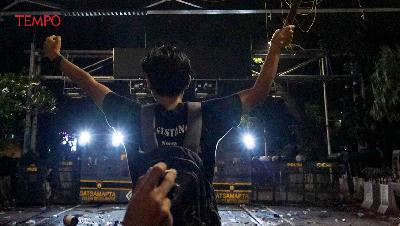Strange Intervention in the Sritex Case
Monday, February 24, 2025
The Sritex bankruptcy liquidators could not work properly to recover loans owed to creditors. There were threats from senior police officers.
arsip tempo : 174618159430.

THE protracted bankruptcy proceedings of Sri Rejeki Isman, or Sritex, a company with 50,000 employees, are the result of government interference. The plan to save the integrated textile company through a bailout has the potential to cause financial losses to the state.
Sritex, together with a number of its subsidiaries, were declared bankrupt by the Semarang Commercial Court on October 21, 2024. The ruling was the result of a lawsuit filed by Indo Bharat Rayon, a supplier of raw materials to Sritex. At the end of July 2024, the company owed a total of Rp25 trillion, but only had assets of Rp10 trillion.
The five months since the court ruling should have allowed the bankruptcy proceedings to be completed. But the team of liquidators only began to handle the Sritex bankruptcy this month because the company management refused to hand over the necessary documentation.
This delay was allegedly a result of intervention from Brig. Gen. Helfi Assegaf, Director of the Special Economic Crimes Unit at the National Police’s Criminal Investigation Department, who put pressure on the liquidators to allow Sritex to continue operations even though it had been declared bankrupt. There are also indications that the police intimidated a number of Sritex creditors by threatening them with prosecution.
From the outset, the government gave Sritex special treatment. One example was the statement from Deputy Manpower Minister Immanuel Ebenezer, who confirmed that there would be no compulsory redundancies for Sritex, even though it had been declared bankrupt. Subsequently, there was talk of the government pushing for an injection of new capital from state-owned companies or private companies.
Given this inappropriate special treatment, suspicions arose that all of this was the result of the closeness of Sritex owner Setiawan Lukminto to former president Joko Widodo. Sritex was a supplier of ‘Presidential Assistance’ bags during the Surakarta, Central Java, mayoral election campaign in October 2020, in which Jokowi’s son, Gibran Rakabuming Raka, was a candidate.
The government should be more realistic in the resolution of the problems involving Sritex. The option of using state funds must be dismissed completely because Sritex, which had a golden era lasting decades, collapsed as a result of poor management.
Indications of chaotic management in the company were apparent when the liquidators found there were 1,654 creditors with total loans of Rp35.72 trillion on the list of fixed receivables. Of this total, liquidators say that there are debts from 11 companies affiliated with Sritex Chief Executive Officer Iwan Kurniawan Lukminto totaling Rp1.2 trillion.
Another reason is that operating a textile and garment plant as large as that owned by Sritex is no easy matter. It requires special skills, management acumen, and extensive experience. It cannot be done by simply considering an approach and then asking state-owned enterprises or private companies to invest. If this happens, it will be like pouring water into a bottomless well.
The government should do no more than act as a good facilitator if there are new investors wishing to acquire Sritex. Meanwhile, the Manpower Ministry and the Social Affairs Ministry need to prepare a program to minimize the negative impacts on the staff if the company eventually closes down.











